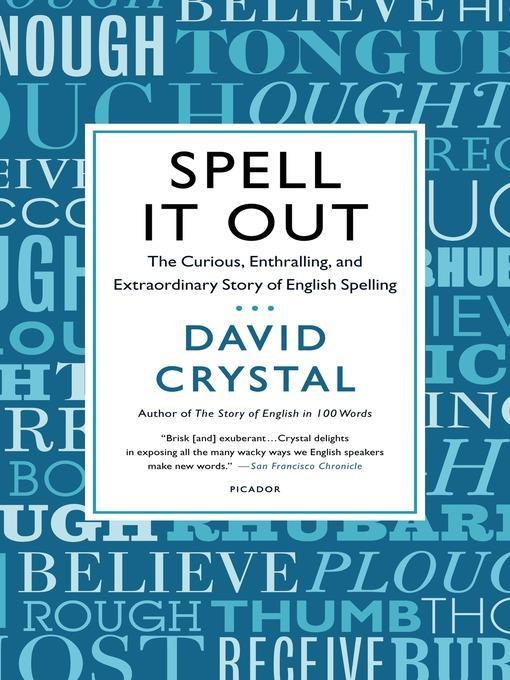
Spell It Out
The Curious, Enthralling and Extraordinary Story of English Spelling
کتاب های مرتبط
- اطلاعات
- نقد و بررسی
- دیدگاه کاربران
نقد و بررسی

Starred review from May 1, 2013
A noted linguistics scholar and prolific author asks and answers the question, "Why do we spell words the way we do?" Crystal (The Story of English in 100 Words, 2011, etc.) argues that many of the traditional ways we teach spelling (using lists of unrelated words, teaching homophones together) have just not worked; he suggests a more productive approach: explaining words linguistically to students--not a surprising suggestion from a linguist. He also notes how, when and why spelling became so important to us and why that's not likely to change. Crystal contends that social media and texting are not harming spelling; you cannot text effectively, he writes, if you cannot spell well. But the meat in his sandwich is the history of the English language, which he relates in swift, focused chapters that frequently conclude with an amusing quotation about spelling from a noted writer (Dickens, Wilkie Collins, Twain) or a cartoon from Punch magazine. He reminds us of our fundamental problem: We have too few letters in our alphabet (26) and too many sounds in our mouths (about 44). But it's even more complicated. Our gumbo of words from Latin, Anglo Saxon, Norman French and all the other languages from which we have borrowed--and from which we continue to borrow--makes learning how to spell so daunting. (The author does not discuss why spelling is easy for some and hard for others.) Crystal goes after the "rules" that many people learned as children ("i before e, except after c" and so on), noting that they are rarely useful and often patently false. He also notes the changes introduced by medieval scribes and early printers and the considerable and lingering effects of lexicographers Samuel Johnson and Noah Webster. An entertaining mixture of erudition, attitude and wit that crackles, spits and sparkles.
COPYRIGHT(2013) Kirkus Reviews, ALL RIGHTS RESERVED.

May 15, 2013
Crystal makes a compelling case that spelling can be an adventure. This whirlwind review of the history of English spelling contains helpful tips for average readers and teachers, with small gems of discovery every few pages. The development of our language was influenced by everything from efficiency to fashion, such as the sixteenth-century love of Latin spelling. His brisk approach takes about as many chapters as there are English soundsa bit more than 26which are the root of several spelling variations. Writers' knotty and convoluted efforts to bring order to this hodgepodge are often doomed, as the myriad exceptions to i before e demonstrate. Although his book is not exactly a love letter to the vagaries of English, linguist Crystal (The Story of English in 100 Words, 2012) maintains an affectionate tone of indulgence, similar to how a doting relative would treat a wayward nephew. For as Crystal shows, spelling is a cultural legacy as humanand therefore as prone to mischiefas anything else we create.(Reprinted with permission of Booklist, copyright 2013, American Library Association.)

January 1, 2013
The author of Crystal's The Story of English in 100 Words considers the insanity of English spelling. Lord, what those Roman missionaries hath wrought by imposing the Roman alphabet on the twisty indigenous languages of the British Isles.
Copyright 2013 Library Journal, LLC Used with permission.

June 15, 2013
Linguistics scholar and author Crystal (Univ. of Wales; The Story of English in 100 Words) delves into the etymological and linguistic backgrounds of words--from their morphology to the influence of other languages over centuries--to create a witty and robust primer on English spelling and how it works. Many readers may be put off by the technical language if they aren't familiar with terms such as phonemes and morphemes, but Crystal's presentation is conversational, and those not deterred by the consonant phoneme chart will find the information well worth studying. VERDICT If Christopher Upward's The History of English Spelling is too academic, Crystal's technical study of a complex subject is accessible and will appeal to those with an interest in language, linguistics, or orthography. [See Prepub Alert, 12/7/12.]--Linda White, Maplewood, MN
Copyright 2013 Library Journal, LLC Used with permission.

























دیدگاه کاربران